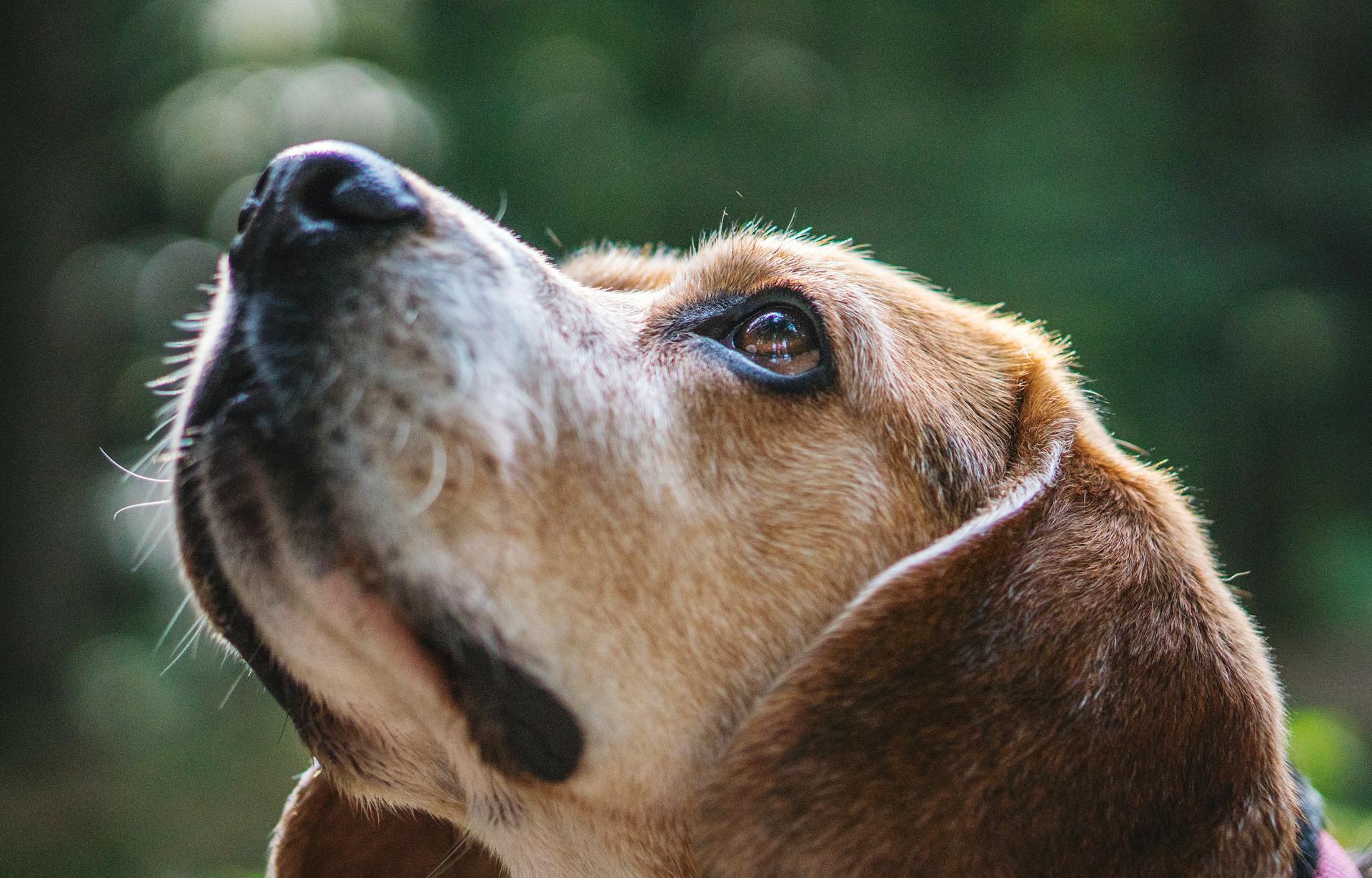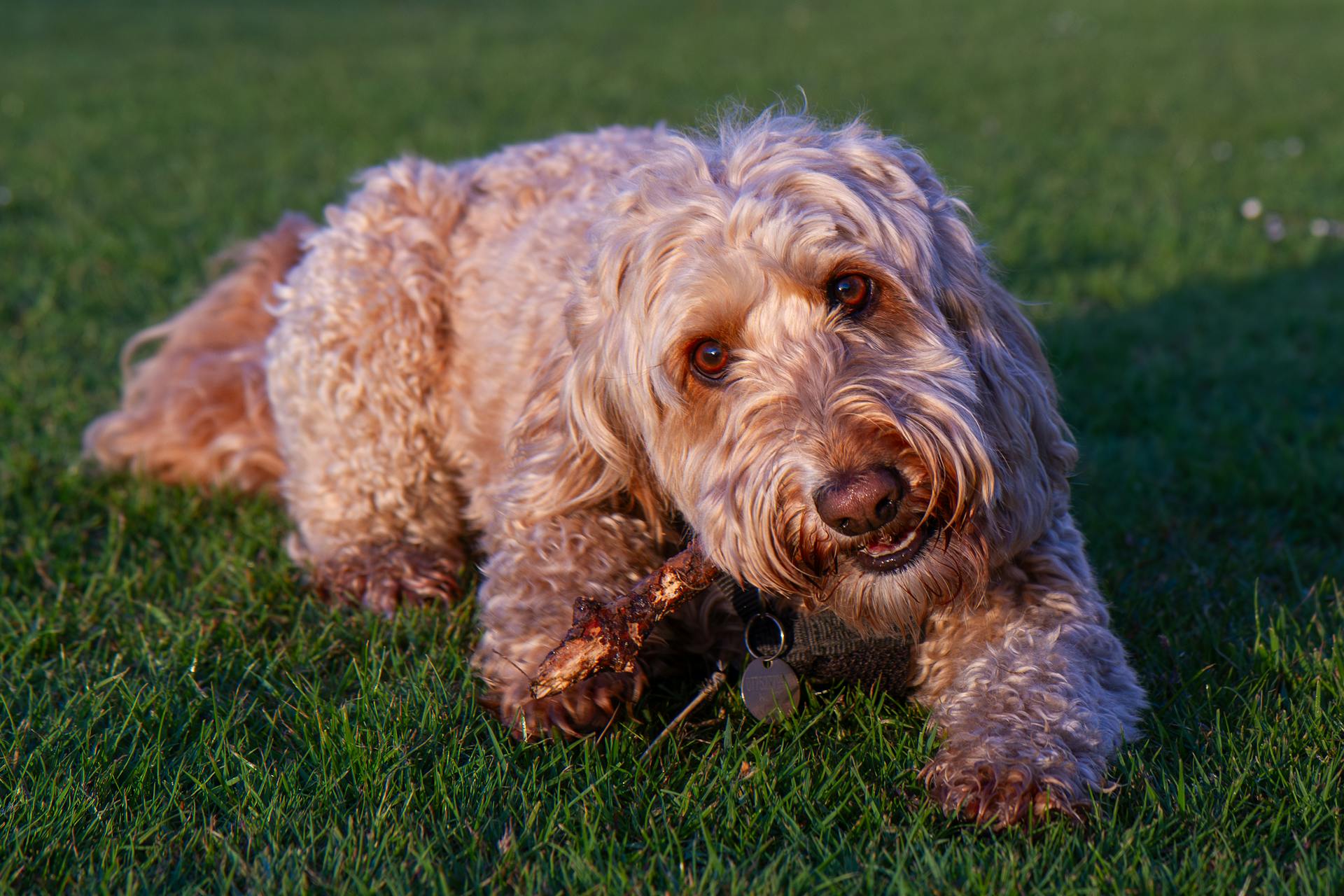
Brown Sheepadoodles require regular exercise to stay happy and healthy, with a minimum of 30 minutes of physical activity per day.
Their intelligence and trainability make them a joy to work with, but they can be strong-willed at times, requiring patient and consistent training.
To keep your brown Sheepadoodle's coat clean and healthy, brush them at least twice a week, paying special attention to the areas where the brown and white colors meet.
Breed Information
The Sheepadoodle breed is a medium to large hybrid with an athletic build that can range anywhere from thickset to slender.
Their coat can be either double or single layered, and it's worth noting that they're known for being low shedders, which makes them a great choice for people with allergies.
Their head shape can vary, but it's often either squarely built like the Old English Sheepdog or slightly domed like the Poodle.
The muzzle is long and can be either thick, slender, or somewhere in between.
Their eyes are oval in shape and usually dark brown, but some Sheepadoodles may inherit bright blue eyes from the Old English Sheepdog breed.
The ears are set right at or below eye level and hang down flat to the side of the head.
Sheepadoodles come in many colors, but white with large patches of black, brown, or gray seem to be the most common configuration.
This breed gained popularity in the 1980s as a low-shedding companion animal that's great with children and will guard their owner's home.
Some Sheepadoodles have ended up in shelters or the care of rescue groups, so consider adoption if you decide this is the right breed for you.
Health and Care
Brown Sheepadoodles are generally a healthy breed, but like all dogs, they can be prone to certain health issues. Bloat is a life-threatening condition that requires immediate veterinary intervention.
Regular veterinary checkups are crucial to detect any health concerns early. Your vet can help develop a care routine that will keep your dog healthy.
Broaden your view: Sheepadoodle Health Problems
Sheepadoodles are prone to weight gain, so daily walks and games of fetch are essential for exercise. Mental stimulation games are also necessary to prevent boredom and destructive behavior. A healthy weight will help protect your dog's joints from damage as they age.
Here are some common health issues to be aware of:
- Bloat (Gastric Dilatation and Volvulus, GDV)
- Hip Dysplasia
- Addison’s Disease (Hypoadrenocorticism)
- Sebaceous Adenitis/Skin Disorders
Grooming is also essential to maintain your Sheepadoodle's coat health. Regular brushing and bathing will keep their coat vibrant and damage-free.
Intriguing read: Flat Coat Doodle
Care
Regular veterinary checkups are crucial to detect any health concerns early in your Sheepadoodle. Your vet can help develop a care routine that will keep your dog healthy.
Sheepadoodles are prone to weight gain, so daily walks and games of fetch are essential for exercise. These smart pups also need mentally stimulating games to prevent boredom and destructive behavior.
Trim your dog's nails before they get too long, usually one or twice per month. You should not hear them clicking against the floor. Your groomer can help you with this.

Maintaining good dental hygiene is vital, even if Sheepadoodles typically don't have oral health issues. Brush their teeth daily, and your veterinarian can instruct you on how to do so properly.
To keep their coat healthy, routine brushing and bathing are essential. This will help their coat remain vibrant and damage-free.
Here are some additional tips for caring for your Sheepadoodle's skin:
- Clean their floppy ears regularly to prevent debris buildup.
- Keep an eye out for signs of skin disorders, such as hair loss, flaky skin, and dryness.
- Consult with your vet if you notice any skin issues or concerns.
Feeding
Feeding your Sheepadoodle requires careful consideration of their high energy needs and tendency to gain weight. They should have a large breed-formulated diet.
Breaking their meals into portions throughout the day can help prevent overeating. This is especially important since they tend to eat very quickly.
Limiting treats is also crucial to maintaining a healthy weight. Engaging in strenuous exercise after meals should be avoided.
As your Sheepadoodle grows from puppyhood to adulthood and into their senior years, their dietary needs will change. Consult your veterinarian for recommendations tailored to your dog's individual needs.
Consulting your veterinarian is essential due to the variation among individual Sheepadoodles, including weight, energy, and health.
On a similar theme: Sheepadoodle Weight
Temperament and Behavior
Brown Sheepadoodles are generally very good-natured and sociable animals. They are very attentive without being particularly needy, making them a suitable pet even for young families.
They are calm, trustworthy, and protective around kids, but may try to herd them by circling, poking with their nose, and occasionally nipping at their heels. This is a natural instinct that can be addressed through training.
Brown Sheepadoodles are very intelligent, but their trainability factor may vary due to their Old English Sheepdog parent breed being independently minded. However, their Poodle parent breed is famously trainable.
Here are some tips to help with common behavior issues:
- Redirect nipping behavior by giving your dog a bully stick to chew instead.
- Consistently not allowing nipping from the beginning is your best bet.
- Stop herding behavior before it begins by directing your dog to sit and stay.
- Intervene sternly when you see your dog wanting to herd.
Temperament
Sheepadoodles are known for being very good-natured and sociable animals. They are attentive without being particularly needy, making them a suitable pet for young families.
Their calm and trustworthy nature makes them protective around kids, but it's essential to supervise interactions between younger children and dogs to prevent unexpected mishaps. Sheepadoodles are also fairly easygoing with other animals, but some may try to herd them by circling, poking with their nose, and occasionally nipping at their heels.
Sheepadoodles are very intelligent, but their trainability factor may vary. The Poodle parent breed is famously trainable, but the Old English Sheepdog is very independently minded, making it challenging to convince them to follow directions.
These dogs are very bright, with a high emotional IQ, and are known to be very playful. They enjoy socializing and roughhousing, making them a great family dog.
Sheepadoodles are very affectionate and love to be around and please their owners. They will enjoy snuggling with you on the couch just as much as they would enjoy going outside for a brisk walk.
Here are some key personality traits of Sheepadoodles:
- Very bright and intelligent
- Very playful and social
- Affectionate and loving
- Generally calm and trustworthy
Some Sheepadoodles may have acquired their herding drive from their Old English Sheepdog parent and will need to burn off energy with plenty of playtime outdoors. They are rather athletic and love to swim, play fetch, and please their owners by learning new tricks.
Sheepadoodles are extremely loyal dogs and make great guard dogs for their households. They respond best to positive reinforcement and will love to be taught a variety of tricks, especially because they need to be mentally stimulated.
Behavior Issues: Nipping
Nipping is a common behavior issue in Sheepadoodle puppies, especially since they're herding dogs with a natural instinct to nip. This behavior can be frustrating for both you and your kids, as it can lead to holes in clothes and hands.
Nipping is not actual biting and usually doesn't hurt, but it's still not good behavior and needs to be trained out of your dog. If you're lucky, your dog will grow out of it, but it's better to be proactive and address the issue early on.
Consistently not allowing nipping from the beginning is your best bet. If you're already dealing with a nipping issue, it's not too late to start training your dog to stop.
Redirecting your dog's behavior is key. One effective method is to give them a bully stick to chew on instead of nipping. This will distract them from nipping and redirect their attention to a more acceptable activity.
It's also essential to not encourage nipping by letting your kids play with your dog in a way that encourages this behavior. I've learned this the hard way, and it's not a habit you want to develop.
Here are some tips to help you train your dog to stop nipping:
- Give them bully sticks to chew on instead of nipping
- Don't allow your kids to encourage nipping
- Consistently not allow nipping from the beginning
- When they stop teething, they will stop nipping if you've been consistent
Behavior Issues: Herding
Herding is a natural instinct in Sheepadoodles that comes from their Sheepdog lineage. This breed is prone to herding animals and humans alike, making it essential to address this behavior.
You can't train this natural instinct out of them, but you can control it. To do so, start by teaching your Sheepadoodle basic commands like sit and stay, which is a breeze for this breed.
Direct the dog to stop and sit when they want to herd. This will help them understand that herding is not approved behavior.
Stopping the herding before it begins is crucial. Intervene sternly when you see the dog wanting to herd each time, and consistently reinforce this behavior.
By doing so, your Sheepadoodle will learn to control their herding urge and not run after kids and others.
See what others are reading: Hungarian Herding Dog
Breed Maintenance
Brown Sheepadoodles require a significant commitment to grooming due to their curly or wavy coats. They need daily grooming to prevent tangling and shedding, especially if they inherit the Sheepdog coat.
Sheepadoodles that inherit the Poodle coat require more frequent bathing and clipping every three weeks to a month. This helps prevent matting and keeps their coat looking great. Regular baths and trims are a must to maintain their "teddy bear look."
In our experience, regular baths and trims keep our Sheepadoodle's coat looking its best. We take him to the groomer every 6 weeks for a bath and cut, and every 3 weeks for just a bath. This costs around $90 plus tip for a full-size Sheepadoodle.
To keep their coat healthy, Sheepadoodles need regular brushing to prevent matting. We swear by a high-quality pin brush, which has made a huge difference in keeping our Sheepadoodle's coat looking great. A slicker brush is also a must for removing mats and tangles.
On a similar theme: How to Groom a Sheepadoodle
Here's a rough estimate of grooming costs:
- Full-size Sheepadoodle cut/bath: $90 plus tip
- Full-size Sheepadoodle bath alone: $50 or so
- Regular baths and trims keep their coat looking great and prevent matting.
Grooming is essential to maintaining your Sheepadoodle's coat health. By brushing their fur regularly and giving them baths, you can keep their coat vibrant and damage-free.
Frequently Asked Questions
What is the rarest color Sheepadoodle?
The rarest color Sheepadoodle is black, which occurs when the puppy inherits a dominant black gene from the Poodle parent. This color is extremely rare due to the genetic combination required to produce it.
What are the cons of Sheepadoodles?
Sheepadoodles require regular social interaction and may develop anxiety and depression if left alone for extended periods, leading to destructive behavior. They are not suitable for owners with long work hours or frequent absences.
Featured Images: pexels.com


